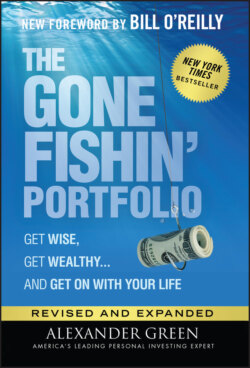Читать книгу The Gone Fishin' Portfolio - Alexander Henry Green - Страница 21
На сайте Литреса книга снята с продажи.
CHAPTER 3 Change Your Mindset, Change Your Life
ОглавлениеThe exceptional person has a vision—of great performances, of a great career, of a great something—and doesn't care what others may say or think.
Source: Bob Rotella, Bob Cullen, “How Champions Think: In Sports and in Life”, Simon and Schuster, 2016. © 2016, Simon and Schuster
During my 35-year career as an investment analyst, I've sought to discover how ordinary people in this country become wealthy, distill this knowledge to its essence and share it with others.
I'm now convinced that to reach your most important investment goals it's essential to develop what I call a “prosperity mindset.” This is an investor's most critical asset.
Your mindset is the filter through which you see the world. It determines how you spend your time, what decisions you make and how you invest your money.
What is a prosperity mindset for investors? In my view, it rests on this foundation:
1 You understand the habits and choices that allowed tens of millions of ordinary Americans to become wealthy.
2 You recognize the major trends—historical, political, cultural, technological and financial—that are making things better for most people in most places in most ways.
3 Based on these trends, you maintain a rational optimism about the future, especially when the nation or the world experiences short-term setbacks, as we always do from time to time.
4 You have a coherent plan that gives you a high probability of achieving your most important financial goals.
5 And you are committed to following through to achieve those goals.
Let's start with understanding how most wealthy Americans got that way.
According to The New York Times, there were 18.6 million millionaires in the United States in 2019.
Spectrem Group reports that there were also more mass affluent households with a net worth between $100,000 and $1 million, excluding primary residences: 31.8 million, or nearly 1 in 4 households.
Yet a Federal Reserve survey that same year found that nearly 80% of Americans live paycheck to paycheck. Half say they would have trouble finding $400 to pay for an emergency.
This is a dramatic disparity, and it has hardly gone unnoticed. People tend to measure their well-being not according to their own material comfort against, say, their parents’, but against their peers.
As a result, economic inequality has become an obsession in recent years. President Barack Obama called it “the defining challenge of our time.” Pope Francis called it “the root of social evil.”
Conventional wisdom holds that the richest Americans are hoarding the nation's wealth while everyone else stagnates or loses ground. This isn't just untrue. It's laughably wrong. Yet most people don't understand why.
Average U.S. household income and net worth hit all-time records in 2019. Things took a dip during the pandemic, but there have never been more households making over $100,000 a year. There has never been a smaller percentage of households earning less than $35,000 in inflation-adjusted terms. It's objectively untrue that the rich are getting richer and the poor are getting poorer. Every quintile has been moving up, not just over the last few years, but for decades.
Yes, the affluent have been getting richer faster than everyone else. But that's not terribly surprising in a knowledge-based economy, where education and specialized skills are in high demand.
However, economic inequality in itself is not morally objectionable. What is objectionable is poverty. Our goal should not be that everyone has the same. It should be that everyone has enough.
This confusion of poverty and inequality is due to what psychologists call the “zero-sum fallacy.” This is the mistaken notion that wealth is a finite resource—like a pizza—that is divvied up in zero-sum fashion. So if Oprah Winfrey has more money, I necessarily have less.
That's not how the economy works. Wealth isn't just distributed. First it has to be created. Total wealth increases—and occasionally decreases—over time. The size of the economy, the amount of household income and total household net worth rise as the years go by.
